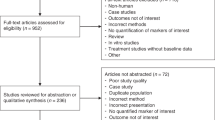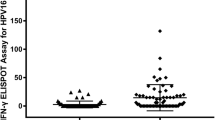Abstract
Human leukocyte antigen-G (HLA-G) expression in 55 cervical intraepithelial neoplasia (CIN) patients with or without human papillomavirus (HPV) infection and 116 patients with squamous cell cervical cancer were examined using immunohistochemistry. Host immune response was assessed by estimating the number of intratumoral lymphocyte infiltration (TIL) in all lesions and counting CD57-expressing cells in the neoplasm lesions. The means of HLA-G immunoreactive scores were compared by the Mann-Whitney test and 1-way analysis of variance (ANOVA). The association of HLA-G expression with disease progression, HPV infection and host immune response was calculated using the Pearson Chi-square test. It was found that HLA-G expression increasingly progressed from patients with CIN 1 to CIN 2/3 and was highest in patients with cervical cancer. Human leukocyte antigen-G expression was also significantly higher in CIN and cancer patients with HPV 16/18 than in CIN patients without HPV. A significant correlation between HLA-G expression and TIL score or the counting of CD57-expressing cells was also evident in CIN patients with HPV infection and cervical cancer cases. These results suggest that HLA-G expression in cervical lesions is associated with carcinogenesis, HPV infection, and host immune response.
Similar content being viewed by others
References
Pisani P, Bray F, Parkin DM. Estimates of the worldwide prevalence of cancer for 25 sites in the adult population. Int J Cancer. 2002;97(1):72–81.
Burd, EM. Human Papillomavirus and Cervical Cancer. Clin Microbiol Rev. 2003;16(1):1–17.
Vermeulen CFW, Ekaterina S, Jordanova ES, et al. Frequent HLA Class I loss is an early event in cervical carcinogenesis. Hum Immunol. 2005;66(11):1167–1173.
Hicklin DJ, Marincola FM, Ferrone S. HLA class I antigen down-regulation in human cancers: T-cell immunotherapy revives an old story. Mol Med Today. 1999;5(4):178–186.
Goncalves MA, Le Discorde M, Simoes RT, et al. Classical and non-classical HLA molecules and p16(INK4a) expression in precursors lesions and invasive cervical cancer. Eur J Obstet Gynecol Reprod Biol. 2008;141(1):70–74.
Zhou JH, Ye F, Chen HZ, Zhou CY, Lu WG, Xie X. Altered expression of cellular membrane molecules of HLA-DR, HLA-G and CD99 in cervical intraepithelial neoplasias and invasive squamous cell carcinoma. Life Sci. 2006;78(22):2643–2649.
Yoon BS, Kim YT, Kim JW, Kim SH, Kim JH, Kim SW. Expression of human leukocyte antigen-G and its correlation with interleukin-10 expression in cervicalcarcinoma. Int J Gyn Obs. 2007;98(1):48–53.
Guimarães MCM, Soares CP, Donadi EA, et al. Low expression of human histocompatibility soluble leukocyte antigen G (HLA-5) in invasive cervical cancer with and without metastasis, associated with papilloma virus (HPV) [Epub ahead of print.]. J Hist Cytochem. 2009; DOI: 10.1369/jhc.2009.954131.
Carosella ED, Moreau P, Lemaoult J, Rouas-Freiss N. HLA-G: from biology to clinical benefits. Trends Immunol. 2008;29(3):125–132.
Urosevic MJ, Dummer R. Human Leukocyte Antigen–G and Cancer Immunoediting. Cancer Res. 2008;68(3):627–630.
Onno M, Pangault C, Le Friec G, Guilloux V, Andre P, Fauchet R. Modulation of HLA-G antigens expression by human cytomegalovirus: specific induction in activated macrophages harboring human cytomegalovirus infection. J Immunol. 2000;164(12):6426–6434.
Lozazo JM, Gonzalez R, Kindelan JM, et al. Monocytes and T lymphocytes in HIV-1-positive patients express HLA-G molecule. AIDS. 2002;16(3):347–351.
Lafon M, Prehaud C, Megret F, et al. Modulation of HLA-G expression in human neural cells after neurotropic viral infections. J Virol. 2005;79(24):15226–15237.
de Oliveira CF, Mota F. Cervical cancer—pre-therapeutic investigations and clinical staging versus surgical staging. CME J Gynecol Oncol. 2001;6:246–256.
Ye SR, Yang H, Li K, Dong DD, Lin XM, Yie SM. Human leukocyte antigen G expression: as a significant prognostic indicator for patients with colorectal cancer. Mod Pathol. 2007;20(3):375–383.
Yie SM, Yang H, Ye SR, Li K, Dong DD, Lin XM. Expression of HLA-G is associated with prognosis in esophageal squamous cell carcinoma. Am J Clin Pathol. 2007;128(6):1002–1009.
Yie SM, Yang H, Ye SR, Li K, Dong DD, Lin XM. Expression of human leucocyte antigen G (HLA-G) is associated with prognosis in non-small cell lung cancer. Lung Cancer. 2007;58(2):267–274.
Yie SM, Yang H, Ye SR, Li K, Dong DD, Lin XM. Expression of human leukocyte antigen G (HLA-G) correlates with poor prognosis in gastric carcinoma. Ann Surg Oncol. 2007;14(10):2721–2729.
He X, Dong DD, Yie SM, et al. HLA-G expression in human breast cancer: implications for diagnosis and prognosis, and effect on allo-cytotoxic lymphocyte response after hormone treatment in vitro [Epub ahead of print.]. Ann Surg Oncol. 2009; DOI: 10.1245/s10434-009-0891-9.
Walboomers JMM, Jacobs MV, Manos MM, et al. Human papillomavirus is a necessary cause of invasive cervical cancer worldwide. J Pathol. 1999;189(1):12–19.
Jung YW, Kim YT, Kim SW, et al. Correlation of human leukocyte antigen-G (HLA-G) expression and disease progression in epithelial ovarian cancer. Reproductive Sciences. 2009;16(11):1103–1111.
Barrier BF, Kendall BS, Sharpe-Timms KL, Kost WR. Characterization of human leukocyte antigen-G (HLA-G) expression in endometrial adenocarcinoma. Gynecol Oncol. 2006;103(1):25–30.
Lin A, Chen HX, Zhu CC, et al. Aberrant human leukocyte antigen-G expression and its clinical relevance in hepatocellular carcinoma. J Cell Mol Med. 2009 Oct 3. [Epub ahead of print].
Kanodia S, Fahey LM, Kast WM. Mechanisms used by human papillomaviruses to escape the host immune response. Current cancer targets. 2007;7(1):79–89.
Hildesheim A, Wang SS. Host and viral genetics and risk of cervical cancer: a review. Virus Res. 2002;89(2):229–240.
Simoes RT, Goncalves MA, castelli EC, et al. HLA-G polymorphisms in women with squamous intraepithelial lesions harboring human papillomavirus. Mod Pathol. 2009;22(8):1075–1082.
Galon J, Costes A, Sanchez-Cabo F, et al. Type, density, and location of immune cells within human colorectal tumors predict clinical outcome. Science. 2006;313(5795):1960–1964.
Cai MY, Xu YF, Qiu SJ, et al. Human leukocyte antigen-G protein expression is an unfavorable prognostic predictor of hepatocellular carcinoma following curative resection. Clin Cancer Res. 2009;15(14):4686–4693.
Cutts FT, Franceschi S, Goldie S, et al. Human papillomavirus and HPV vaccines: a review. Bull World Health Organ. 2007;85(9):719–726.
Author information
Authors and Affiliations
Corresponding author
Rights and permissions
About this article
Cite this article
Dong, Dd., Yang, H., Li, K. et al. Human Leukocyte Antigen-G (HLA-G) Expression in Cervical Lesions: Association With Cancer Progression, HPV 16/18 Infection, and Host Immune Response. Reprod. Sci. 17, 718–723 (2010). https://doi.org/10.1177/1933719110369183
Published:
Issue Date:
DOI: https://doi.org/10.1177/1933719110369183




